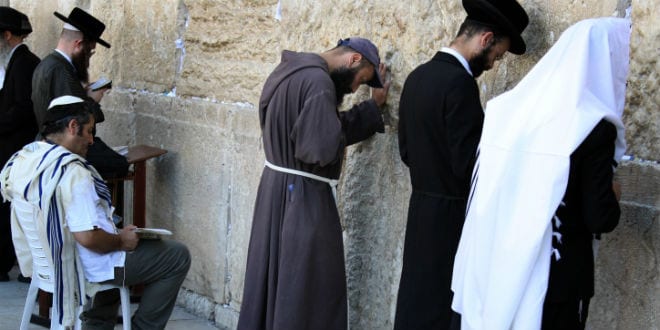“Don’t force me to leave you or to turn back from you. Where you go, I will go; where you stay, I will stay. Your people will be my people, and your God will be my God. Where you die, I will die, and there I will be buried, so help me God —not even death itself is going to come between us!” (Ruth 1:16-17)
This week, the Jewish people recount Ruth’s commitment and faith reading The Book of Ruth during Shavuot, Pentecost. It’s astounding to read her words and the meaning behind them. It’s also all the more appropriate now, as Shavuot marks the anniversary of God giving the Torah to Moses. Every year the Jewish people stand together, as if at Sinai, and reaffirm our own faith with the words spoken at Sinai, “We will do and hear everything the Lord has said.” (Ex. 24:7)
With her declaration, Ruth grafted herself into the Jewish people. She was rewarded by becoming the great-grandmother of King David, through whose lineage the messiah comes. Ruth’s meritorious character would have been displayed enough with only her affirmation of verse 16. However, she went a huge step further, not just by casting her life with Naomi and the Jewish people, but even her death. Through that, she was not just grafted in, but her legacy became intertwined with the Jewish people.
Talk about permanence! While there are many possible translations, “not even death is going to come between us” is a powerful affirmation.
There’s something else extraordinary about Ruth. She was a Moabite. Moab was an enemy of the Jewish people. Ruth rose above her people’s animus for the Jews, cast that aside, and threw her entire lot in with Israel.
It’s not news that Jews and Christians are coming together as never before. There are many examples. This is a restoration of a relationship that was broken nearly 2000 years ago, and is significant on many levels. Ruth was not a Christian, but hers is one of the early and unique Biblical examples of a gentile aligning with the Jewish people. Her example is so significant, and the precedent so relevant today, that her legacy is preserved in a whole Book of the Bible.
Christians are standing with the Jewish people as never before, very much fulfilling Ruth’s words in verse 17. It’s become increasingly popular not only to stand with the Jewish people with every breath, but even to do so after one is no longer alive, or, no longer on this earth.
A growing number of Christians have chosen to stand with Israel, and to bless Israel, even after they are no longer here. Much of this is being done through what’s known as legacy gifts; donations made whose impact carries on after one’s death. It’s a very common means of supporting charities and causes that one feels strongly about after death. The most common of this are bequests, life insurance, and donation of appreciated assets. There are many tax advantages for the donor, as well of course as the beneficiary charity.
These are innovative and special, blessing Israel and being blessed even after one is not alive. It embodies Ruth’s vow to Naomi. As an organization responsible to build bridges between Jews and Christians and Christians with Israel, the Genesis 123 Foundation has launched an effort to enable Christians affirm and be part of Ruth’s legacy, while leaving their own.
Perhaps the most remarkable affirmation of this desire to stand with Israel and the Jewish people took place in a conversation with Anne Graham Lotz, with whom I have been privileged to become good friends. There are not enough good words to say about her: her warmth, her faith, her love of Israel, and so much more. It is a relationship that I cherish. When I look to Biblical examples, she is very much a Ruth.
Some time ago, Anne asked me how I would feel if she would leave me her possessions after she is raptured. It was a conversation for which I could not have been less prepared, but was meaningful and one which I will never forget. “What a beautiful affirmation of your faith,” I said, “and an expression of your heart for Israel to stand with and bless Israel, even after you’re no longer here. I love it, and would be privileged to be part of that.” Some time later, Anne shared with me that should the rapture take place before her death, she had signed documents that leave her home to me. It still moves me deeply to think about this and everything that it represents, just like Ruth and her love for Naomi and the Jewish people.
While there are different views of the rapture, the point is that whether or not one is raptured before dying or not, there are many simple ways that Christians can leave a huge legacy, supporting and standing with Israel and the Jewish people. Dr. David Pitcher wrote a book on this very topic: “After the Rapture – Passing the Torch.” It details biblical reasons and practical steps why and how Christians should leave their assets to the Jewish people. It has been described as “an eye opener (teaching) about end times with authority (whose) message will convict your heart.”
With tax laws always changing, it’s always smart and important to do estate planning. Something as simple as tithing one’s estate to a Jewish organization is a powerful way to stand with Israel, and pass the legacy of blessing Israel on to one’s family. For all those who have done so already, and for those who have yet to do it but love the idea, may God see the purity of their heart and bless them through their lineage, that they should be honored no less than Ruth.
The Genesis 123 Foundation welcomes the opportunity to discuss your own legacy and how you can continue to bless Israel even after you’re no longer here, www.Genesis123.co.





